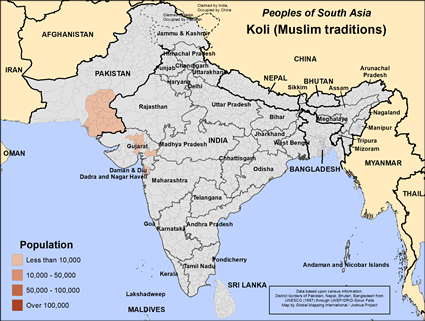Very little is known about the history of the Koli people, and there is conflicting information about their origins. There are several Koli subgroups. The Koli people of Pakistan speak the Sindhi language.
According to one source, the Koli were once a fishing community.
The Koli Muslim people are located in southeast Pakistan. They are primarily concentrated in the lower Thar Desert, (also known as the Great Indian Desert) east of the Indus River. Most of the Thar Desert is in India, and it forms a natural boundary between these two hostile nations. It is one of the world's largest desert regions.
The traditional occupation of the coastal Koli is fishing, although many are now employed in schools and government offices. Other Koli people work in agriculture. As sharecroppers, they raise cotton, wheat, rice, sugarcane, corn, and oil seeds. The biggest problem for the farmers is the control of the water supply. Some of the tribes live near the eastern tributaries of the Indus River, which overflows in July and August, serving as an irrigation system for their crops. The Koli tribes living in the eastern portion of the Thar Desert raise livestock. This region displays sand dunes with patches of clay. Camels are their transportation. Life is hard for the Thar people, especially the women who must collect firewood and water each day.
Koli people exhibit a vivid array of colors in their paintings and other artistic designs.
Some live in simple houses with thatched roofs, mud walls, and dirt floors; others live in decorative homes with tiled roofs, brick walls, and paved or cement floors.
Most of the Koli people live in poverty. Less than half of them are literate. Their social status is considered low, but not "impure." Their spiritual poverty is most desperate.
Koli people in Pakistan are 100 percent Sunni Muslim; they are unreached and unengaged. They live in an Islamic republic with a Sunni majority. Shari 'a law is increasingly applied throughout Pakistan. There is a degree of religious freedom promised to minorities by law, but in practice, non-Muslims and non-Sunnis must practice their faith cautiously or risk attack by the Sunni Muslim majority. Pakistan is noted on the Open Doors Persecution List of 50 countries as number four.
The Koli people need to know that true peace and love can only be found through a relationship with Jesus Christ.
Of the four Koli groups in Pakistan, only the Parkari Koachchhi have access to portions of Scripture in their own language. Due to their low literacy rate, they first need to be taught how to read so that they might understand God's word when it becomes available to them.
Evangelistic resources in the Sindhi language such as Christian radio broadcasts, television programs, and the JESUS Film are desperately needed to reach these illiterate groups. Perhaps Christian teachers will have the greatest opportunities to live and work among the Koli.
Pray for a team of knowledgeable believers to help the Koli people build and maintain wells in their desert homeland.
Pray for the Koli people to have easy access to the many Christian resources that are available to them in the Sindhi language.
Pray for a disciple-making movement to begin among the Koli people and spread to other Muslim peoples in Pakistan. Poverty and illiteracy plague the Koli people.
Pray that the many gospel resources will soon be available, along with people to help them understand God's truth.
Pray that the Holy Spirit will help them to turn to Jesus for answers.
Scripture Prayers for the Koli (Muslim traditions) in Pakistan.
https://joshuaproject.net/people_groups/17595/PK
https://joshuaproject.net/people_groups/17247/PK
http://wwwprayway.com/unreached/clusters/8081.html
http:/kcm.co.kr/bethany_eng/clusters/8081.html
https://www.britannica.com/topic/Koli-caste
http://www.dawn.com/news/1102038
http://www. Prayway.com/unreached/clusters/8081.html
https://en.wikipedia.org/wiki/Koli_people
https://www.revolvy.com/topic/Koli%20people&item_type=topic
https://www.operationworld.org
| Profile Source: Keith Carey |











